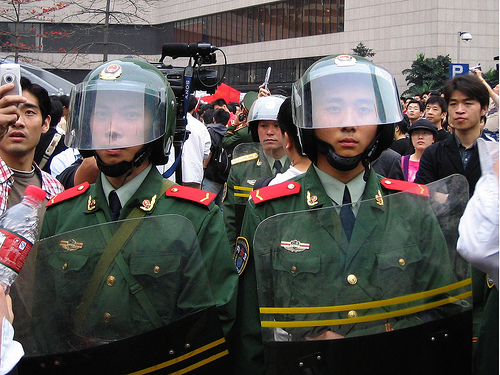China Wants Its Hands All Over Your Internet


- Read also: U.S. finally acknowledges Chinese and Russian cyberthreat
- Further reading: EU and U.S. in first joint cyber security stress-test exercise
If I was China right now, I'd be SO embarrassed.
I mean, if I had just turned in a big report to the U.N. proposing an internet "Code of Conduct" under the guise of security and fighting cyber crime, and then the U.S. Office of the National Counterintelligence Executive issued a report saying I was doing the very things that would violate that proposal...
Well, it would be way worse than that time I showed up to the first day of 8th grade homeroom and Becky the cheerleader was wearing the exact same blue Banana Republic sweater that I was.
I'm in no way trying to minimize what's going on here, but it's difficult not to think The Onion is orchestrating China's PR around its intent to make sure everyone on the internet is dressed appropriately.
I'm actually not taking the analogy too far. Let me explain.
Last week the Chinese government stepped up monitoring of the internet inside its borders. Hard to believe, right? It started with an anti-porn and anti-vulgarity censorship campaign on mobile devices back in 2009, but this new crackdown is on China's many popular microblogging sites (Twitter is a microblogging site).
- See also: #Egypt Blocked in China: Is Internet Access A Human Right?
- Don't miss: China Censors 60K Websites, 350+ Million Pages, Proud Of It
China shut down 50 microblogs for alleged porn and "vulgarity" last Monday, and it's clear that China's State Internet Information Office doesn't like anything that offers Twitter-like functionality.
But it's okay if it's all about getting rid of dirty bad porn and sex work, and cyber crimes, right? Well, maybe for you.
Even if you don't like porn you should be worried when things get called porn. "Porn" is often code for stuff that authorities just don't like. It's an "if you're not against it, you're for it" move. Everyone's afraid to question accusations of porn and sex and obscenity, so it's a convenient foil for discrimination and censorship.
Most of the time, from Facebook to China, the thing that gets labeled "porn" or "obscenity" silently disappears. But consider that a lot of us who believe in the open internet also believe that sexual expression, sex education and artistic expression should remain part of protected, free speech, and you've got a problem that could get a lot bigger than China.
The method reveals the madness, and woe to the microbloggers. According to Reuters (China),
China's microbloggers showed their potency in a string of recent official scandals, particularly an online uproar in the wake of a high-speed bullet train crash in July that killed 40 people. Microbloggers led the charge in challenging rail officials' evasive accounts of the disaster.
Chinese state media have demanded that Internet companies, regulators and police do more to cleanse websites of "toxic rumors."
It passed largely under the radar. But I sat up a little straighter in my office chair when I also saw that China had just issued a strong appeal to the United Nations for a "global set of Internet rules."
The Chinese ambassador addressed the UN General Assembly on information and cyberspace security (they're in charge of international security), urging the move as a means toward a peaceful and more secure internet and the "well-being of mankind."
This is not to be confused with September's power play at the 66th session of the UN General Assembly. China (with Russia, Tajikistan and Uzbekistan) submitted an "International Code of Conduct for Information Security" to the UN, proposing rules for certain behaviors, information and cyber security.
China's microblogging purge raises serious questions about what kind of rules they'd like to see enforced in an internet "Code of Conduct." Keep in mind that China's been working this angle since at least 2005.
It was refreshing to see prudish Lady England come to her senses about internet censorship for a minute. This past week at The London Conference on Cyberspace the UK's Foreign Secretary strongly reacted to the 'Code of Conduct' proposal, saying that it would amount to government censorship.
That's why China is, like, so much more mortified right now with the U.S.' cybercrime report.
The report released to Congress yesterday outright named China and Russia as the main culprits of online industrial spying on the U.S. - the countries were named because the threat was apparently unusually definite.
Naturally, China's not having any of it; an embassy spokesperson lashed out at the report and denied China's involvement in any cyber crime activity.
China's just not going to win against the open internet.
If it were me, I'd just go home and change my sweater.
Image by Michael Mooney, under a Creative Commons 2.0 Generic license, via Flickr.